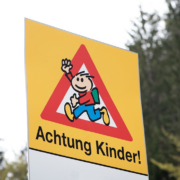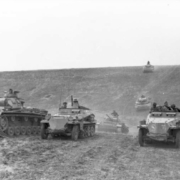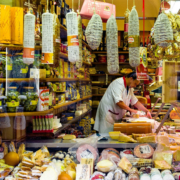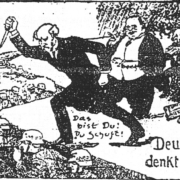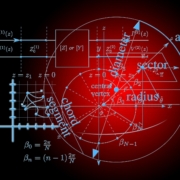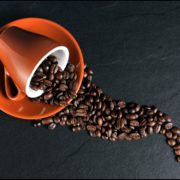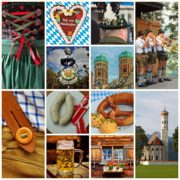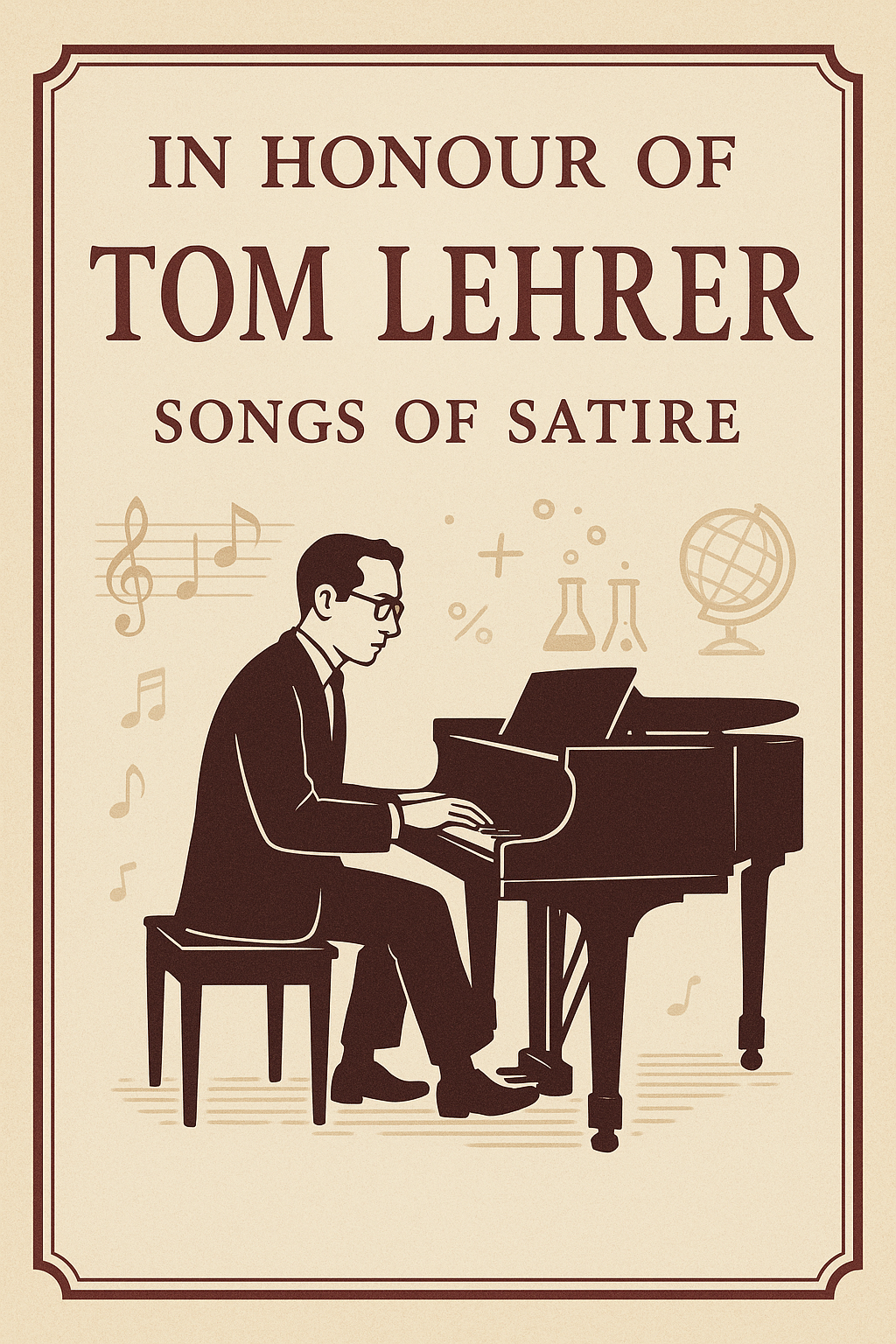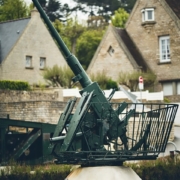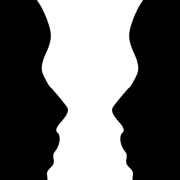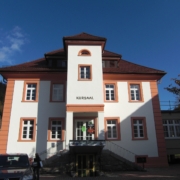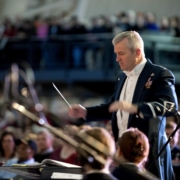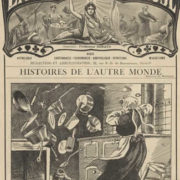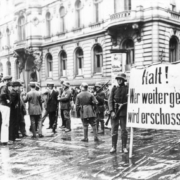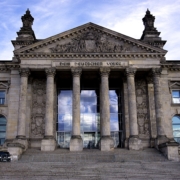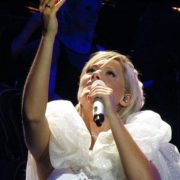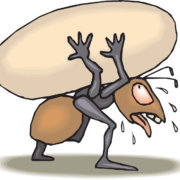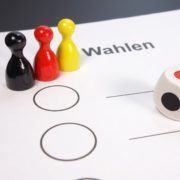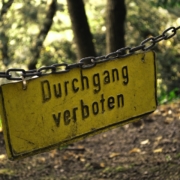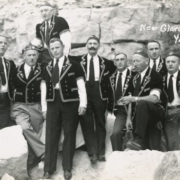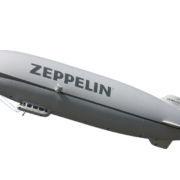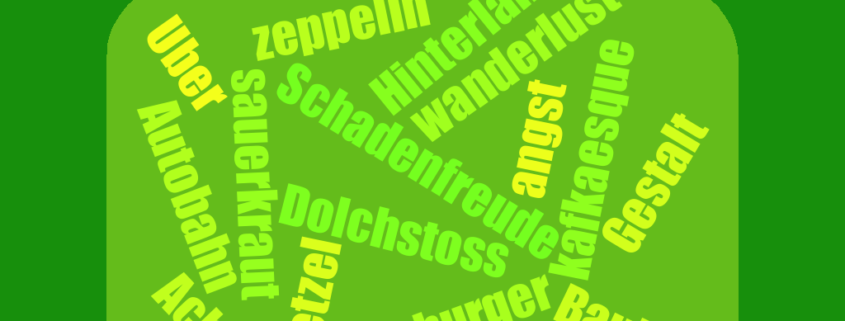
Do German imports make English rich?
Here we are collecting, defining and explaining some of the many German words now used in English. Some are surprising. Languages often import words when they need or want an exact word which they lack, or they just like a foreign word better. For a list of ‘recent finds’ please see our German words in the news page.
The English verb abseil is taken from the German compound verb abseilen. Ab means from, away, or downwards in German compound words, the German noun Seil means simply rope, and the suffix -en creates the infinitive form of a verb. In Alpinism this denotes travel downwards along a rope, meaning one can rapidly descend a vertical face with a controlled slide along a rope, usually with a safety rope as backup. Abseiling has become an enjoyable activity away from mountaineering for the sheer joy of floating through the air, and is also a technique employed by emergency services.
Abseiling normally requires an anchored rope, a means or device of controlling movement by friction on the rope, and a safety rope attached to the abseiler and supervised from above. In the USA abseiling is usually described as rappelling, from the French verb rappeler, meaning to recall or call back.
German Meaning: Ab means from in German, or downwards in compound words, and Seil means rope.
Example: The vicar abseiled down the church tower every August to raise funds.Achtung means attention in German, and is used in German announcements, signs and warnings. It is particularly familiar to English speakers from films in which they see the military usage, meaning officers calling soldiers to stand at attention. This has lead to half-joking usage of the term in informal English to get people to pay attention, and featured in the title of Irish pop group U2’s 1991 album Achtung Baby, which was recorded in Berlin
German Meaning: Achtung is a noun meaning attention in German, and can be used alone with the meaning of "Your attention please", Watch out!", "Danger", "Caution!", or "be aware of...".
Example: "Achtung bro, you gonna set the house on fire like that," he said.Angst is used in English to describe general anxiety, which may have no specific cause, and may be about the general state of the world. It tends to suggest doom and gloom and unmanageable feelings of helplessness in the face of a cloud of problems. The term is nowadays often used, possibly disparagingly, to refer to the worries and concerns adolescents face in growing up. While fear and anxiety may be a response to a stimulus or environmental factor, Angst in English suggest more a fundamental condition of worry and unease that is part of the human condition – perhaps explaining the need to import a simple foreign word meaning fear to describe a more precise condition.
German Meaning: Fear
Example: Adolescent Angst sees young people worry a lot about how their peers perceive themThe forced annexation of the country of Austria by Nazi Germany in 1938 is known as the Anschluss, the German term used at the time to describe the event. Anschluss means simply connection or joining, but the political reality was that the threat of military force and civil unrest compelled Austria to accept this union. Nazi propaganda featured numerous images of Nazi soldiers marching into Austria unopposed.
Austria up until 1918 had been, together with Hungary, at the centre of the extensive multi-ethnic Austro-Hungarian empire in Eastern Europe, but became a small standalone nation after the end of First World War in 1918. The Versailles Treaty of 1919 formally ended the First World War, and advocation of self-determination for ethnic and national groups saw the creation of new, smaller nations in Eastern Europe. The Versailles treaty made it illegal for Austria to become part of Germany, despite their shared language and the desire of many Austrians to join Germany at that time. After the establishment of the Nazi dictatorship in Germany in 1933, many Austrians preferred to remain an independent nation, but the nations responsible for enforcing the Versailles Treaty chose not to respond to the Anschluss. Austria remained part of Germany and the German military during the Second World War, which lasted from 1939-45. After the defeat of Germany and the end of the war, the victorious Allied powers declared the Anschluss to be void and Austria returned to being the small independent nation which it remains today.
German Meaning: The noun Anschluss means connection, from the verb anschliessen, meaning connect or join.
Example: Russia's annexation of Crimea reminded many of the Anschluss of Austria.Image kindly supplied by the Bundesarchiv under a Creative Commons license
An Autobahn is a motorway in Germany as well as in Switzerland and Austria, meaning a large purpose-built, limited-access road solely for motor vehicles making long-distance journeys at speed. Construction of the German Autobahn network began in the 1930s, well in advance of mass car ownership, and was the world’s first of its kind and an example to others. Even today many sections of Autobahn in Germany have no speed limit, allowing unlimited speeds and fuel consumption, and CO2 emissions.
Autobahn is also the title of a 1974 album by influential German musical group Kraftwerk, who are shown on the cover travelling on an Autobahn.
German Meaning: Auto means automobile and Bahn means way, track, path or course.
Example: The German Autobahn is famous for having no speed limits, fast traffic, and no tolls to pay.
The Europa Bridge shown above was for a time the tallest bridge in Europe. Located on the A13 Autobahn in Austria, it was opened in 1963 by the Austrian Chancellor, who asked that it should join “the peoples of Europe in peace and freedom.”
The Bauhaus was a short-lived but groundbreaking German school of art and design which existed from 1919 to 1933, launching new thinking and styles with huge influence even into the twenty-first century. The Bauhaus intended to respond to industrialisation by bringing together all art forms, and by changing design methods to shape the new era and its new materials. Bauhaus in English today refers to both this historic school and its thinking, and also to a widespread modernist style of architecture and design, and even furniture, which originated there. In architecture this may be called the International style, or Modernist Architecture, and is characterised by clean, simple lines, an absence of ornamentation, and a focus on function. The new Bauhaus school building depicted here was designed by Walter Gropius and opened in Dessau in 1927 having been commissioned by the city itself, and typifies the Bauhaus movement’s style.
The Bauhaus school chose to shut down in 1933 under strong pressure from the Nazi party, who had taken power in Germany in that year and were highly critical of what they claimed were Bauhaus values and influences. In 1937 the Nazi party even arranged a now famous exhibition titled Degenerate Art showcasing works they despised, many by artists widely respected to this day. Many Bauhaus teachers and practitioners continued to spread Bauhaus ideas, often in exile and so reaching even wider audiences. The global proliferation of sometimes homogeneous Bauhaus style prompted US author Tom Wolfe to publish a critical essay in 1981 titled From Bauhaus to Our House, in particular lamenting the lack of ornamentation.
2019 is the hundredth anniversary of the birth of Bauhaus, with celebrations, commemorations and reflections taking place around the world.
German Meaning: Bau means build, or building, or construction, and Haus means house.
Example: The Bauhaus is thought to be the most influential design school ever.Adding the German noun Berg, meaning mountain, to the end of an English noun can create a new English word meaning “a mountain of,” as in iceberg. More recently the problem of fat build-up and the resulting obstruction in urban drains and sewers has given rise to the term fatberg, which is itself being imported into German as it uniquely describes a new phenomenon. Alleged surpluses of subsidised EU agricultural goods could also lead to English terms such as the butterberg, and the German language does, in fact, already have the established term Butterberg.
In wartime 1917, the current British royal family actually chose to remove the German word berg from their family name, adopting Mountbatten instead of Battenberg. A battenberg remains a popular kind of multi-coloured sponge cake in the UK, featuring a sweet, cream-coloured marzipan outer layer.
The choice of image for this article will come as no surprise to Wolfgang Ambros fans.
German Meaning: Berg means mountain.
Example: A huge fatberg blocked part of London's sewer system.A bildungsroman is a novel which chronicles the struggles and development of a young person as they enter the wider world and are forced to mature. This term was coined by a German academic in 1819, after the first novels of this type were published in the late 18th century in Germany, with the best known of those being Goethe’s 1795 novel Wilhelm Meister’s Apprenticeship. The genre later spread to other countries and languages, with Charlotte Brontë’s 1847 novel Jane Eyre being an early example in English.
A bildungsroman is sometimes called a novel of education or a novel of formation because the main character faces various obstacles and challenges which shape their character and move them to maturity. This can be seen as a more specific genre of literature within the wider genre of the coming of age novel.
German Meaning: Bildung means education or formation, and Roman means a novel.
Example: Frank Herbert's scifi novel Dune is also a bildungsroman about a young man emerging as a leader.Blitz has become a noun and a verb in English, used to refer to a rapid campaign or assault, usually one that totally takes care of a task. This can mean a sudden, overwhelming military attack, or more commonly, a fast and concerted campaign to achieve something or overcome something. A media blitz or advertising blitz, for example, means a big, coordinated effort to flood the media with the desired message at the desired time.
Blitz means lightning in German, with all the expected connotations of speediness. The compound word Blitzkrieg means literally “lightning war” or “lightning warfare” and referred to a second world war German tactic of extremely fast mechanised and aerial assault to take large amounts of territory from an enemy. Consequently the English term “the Blitz” or “during the Blitz” is still widely used to refer to the period of sustained bombing raids on London during that war. Interestingly, in the case of London the word blitz refers to a lengthy campaign that did not result in loss of territory or surrender. The term is also used in American football for a particular attack move by defensive players.
In informal speech getting blitzed can mean getting intoxicated with drink or drugs, as in the title of a well-researched book about the Third Reich’s extensive use of stimulants such as amphetamines, Blitzed: Drugs in Nazi Germany by Norman Ohler. Nowadays, to blitz something is sometimes used in a culinary context, especially in the USA: recipe directions may say “blitz all ingredients together in a blender to make a smoothie”.
German Meaning: Blitz means lightning
Example: The boss wanted a blitz on housekeeping before the conference, so the staff blitzed all the cobwebs and dust.Blitzkrieg is a German language term used to describe fast-moving, mechanised attack warfare, as originally practised by Germany early in the 1939-45 Second World War. Blitz means lightning and Krieg means war, so this is a lightning strike to overcome the enemy, as Germany did in France in 1940. Lightning War, also called at the time Bewegungskrieg, meant a sudden attack with an overwhelming force of combined air, artillery, armour and ground troops with radio communication, bringing the latest technology into play and making it hard for the opponent to react in time. This was very much in contrast to the static, trench- based warfare of most of the 1914-18 First World War.
The term is now widely used to describe rapid, overwhelming attacks. Interestingly the famous Roman general and later dictator Julius Caesar was famous for surprising and defeating his enemies by arriving early at likely battle sites after putting his men through many days of forced marches, and is sometimes seen as an early practitioner of Blitzkrieg.
German Meaning: Blitz means lightning and Krieg means war.
Example: The first Gulf War of 1991 featured a blitzkrieg style attack on Iraqi forces who had invaded Kuwait.Image of German armoured vehicles in Ukraine in the Second World War kindly supplied by the German Federal Archive under a Creative Commons licence.
A Dachshund is a popular pet dog with a long, low body and extremely short legs, which originated from Germany. The word Dachs means badger in German, and in earlier days hunting badgers was a widespread activity which used dogs. Despite their endearing appearance as pets, these dogs were actually bred to fit down badger holes and even fight badgers.
Dachshunds are sometimes comically referred to as “sausage dogs” or “wieners” because of their long tubular shape, not because of any risk they might hunt sausages or be eaten like sausages.
German Meaning: Dachs means a badger, and Hund means a dog.
A delicatessen is a shop selling delicacies and food specialities, and usually also prepared dishes to take away, as well as foreign or exotic culinary items such as fine cheeses. Delicatessen is often shortened to deli, with both that and the full word used also to refer collectively to products of the sort you would find in a delicatessen, with many cafes and now even supermarket counters advertising themselves as Deli.
The word comes to English from the plural of the German word Delikatesse, originally meaning in German a culinary delicacy, itself taken by German from the French term délicatesse, also meaning a delicacy, itself in turn taken from the original Italian term for a delicacy, namely delicatezza. The Italian word’s Latin root word delicat actually meant pleasurable or delightful, rather than delicate in the English language sense of fragile. Delikatessen shops sprang up in the German-speaking world in the 18th century, and from the mid 19th century in the United States delicatessen shops were opened by immigrants, leading to widespread use of the word in English-speaking countries.
A delikatesse is also a specialist breed of cucumber.
German Meaning: Delicacies, or a shop selling them.
Example: The Harrods department store in London features an extensive delicatessen section.In the German language Diktat corresponds to the English word dictation, meaning text for audio transcription, from the Latin root word for dictation. Diktat in German is also used to describe conditions imposed by a political or military victor, and the best known example of a Diktat is the set of conditions and reparation obligations unilaterally set for Germany in 1919 by the victor nations in the Treaty of Versailles at the end of the First World War.
In English a diktat is a rigid rule that must be obeyed, or the issuing of such rules. A government which rules by diktat simply issues executive decrees rather than using a parliamentary process or legislation. In English diktat has also become a pejorative and even mocking term for any dogmatic statement or attempt at control by decree.
German Meaning: A Diktat in German is a text for audio dictation, or a decree of terms imposed by a victorious party.
Example: The latest diktat from head office banned vapes on company premises.A Dolchstoss, written in German as Dolchstoß, usually refers to an alleged political stab in the back, which a losing leader claims is entirely responsible for their defeat. This use of the word originates from the end of the First World War, when a change of government in Germany preceded the country’s decision to end the war and concede defeate, leading to the Armistice and then the Treaty of Versailles. Right-wing and militaristic elements in Germany then persistently claimed that they had not lost the war on the battlefield, but had been stabbed in the back and betrayed by weak-minded peace-loving politicians who robbed the nation of victory. These claims, also known as the Dolchstosslegende, or Stab In The Back Myth, were repeated up to, and throughout, the Nazi dictatorship under which Germany initiated the Second World War.
Germany had conclusively defeated Russia in 1917, freeing up military resources for the Western Front and bringing hopes of victory over France and Britain. Germany’s decision to resume unlimited U-boat warfare in 1917 was a gamble to speed the end of the war, which ran a high risk of drawing the United States into the war given the US policy reaction to earlier sinkings of their ships by German U-boats. The United States then declared war on Germany in 1917, and in 1918 the new weight of American arms and men and the force of new technology in the form of the battle tank decisively pushed the Germans back from August 2018.
Historians believe, as did the German military high command at the time, that Germany had conclusively lost the First World War in the autumn of 1918. Later claims of being stabbed in the back, the famous Dolchstoss, were a propaganda myth, know in German as the Dolchstoßlegende, or Stab In The Back Myth.
German Meaning: Dolch means dagger and Stoß means a push, shove, blow, stroke, or thrust.
Example: US presidential candidate Hilary Clinton saw FBI Director Comey's late intervention in the 2016 US election campaign as a Dolchstoss.A doppelganger in English is an uncanny double of a person, either real or imagined. The anglicised word rhymes with banger, but in the original German word ‘Doppelgänger’ the letter ä (referred to in English as ‘a umlaut’) is pronounced to sound like the e in the word ‘length’.
A Doppelgänger may be an unseen shadow or an actual entity, an example of being in two places at once, which is termed Bilocation. The word is sometimes jokingly used to refer to a person so similar in appearance they could be taken as a copy of another, and in fiction this can be a dark and threatening figure. Famous literary doppelgangers are well described in the article “True Stories of Doppelgangers“.
German Meaning: A Double. Doppel means double and Gänger means one who walks.
When periods without wind happen at night, there is no energy output from wind turbines and solar panels. Despite growing use of renewables, the English language has no single precise technical term for this challenging phenomenon yet. The German term for a period of renewables being becalmed at night is Dunkelflaute and has come to prominence due to the example of Germany’s advanced energiewende programme. Maintaining a steady energy supply requires addressing this problem, usually by developing or refining energy storage methods, so the German term is breezing into English language technical literature.
Dunkel means dark, here as in the darkness of night, and the noun Flaute means both an absence of wind or an absence of demand from purchasers in a market. English translations might best be Dark Interval or Dark Pause, as English struggles to find its own term for the absence of wind, offering such terms as windlessness, becalmed, stillness and so on.
German Meaning: Dunkel means dark and Flaute means the absence of wind, or the absence of demand for products and services
Example: Improved energy storage methods are addressing the dunkelflaute challenge.The German word eigen is used as a prefix in technical and scientific English to denote the characteristic or proper value of a variable, often a vector. The term eigenvalue began to replace the English term “proper value” in this context at the start of the twentieth century, offering a more distinctive and memorable word which is now typically used with linear algebra and matrix theory in mathematics and physics. The technical terms eigenvalue, eigenquation, eigenvector, eigenspaces, eigenbasis and eigendecomposition are all currently in use in English.
The German adjective eigen corresponds to the English adjective own, in the sense of one’s own, or what is proper or characteristic. Adding the suffix -schaft to create an abstract noun actually gives the German word Eigenschaft, meaning a characteristic. Adding the suffix -tum to describe a condition or collective idea yields the German noun Eigentum, meaning property or possession.
German Meaning: The adjective eigen means own, one's one, or characteristic.
Example: Eigenvalues are essential to the analyisis of linear transformations in mathematics.The Energiewende is a transition to low-carbon and no-carbon energy sources. The German government have set a policy with a national target of obtaining all the country’s energy from renewable sources by the year 2050. Germany spends significantly on energy research, and the project and planned transition are providing an example to other countries. All German nuclear power stations are shutting down by 2022, and coal burning will be phased out. Renewable energy sources will include wind, solar, and hydro, and in many cases this makes energy provision less centralised and more subject to local democratic control. A remarkable transition to renewable energy is also under way in Britain and other countries, including also wider adoption of the Passivhaus.
The term Energiewende originated in the early 1980s, and with it the key recognition that economic activity can increase without growth in energy usage. The noun Wende can mean a turn, change, turning point, and even a U-turn. The term Wende is also currently used in German to describe the change that occurred when the government of East Germany collapsed and then East and West Germany were reunited. The period after 1989 and the fall of the Berlin wall is said to be “nach der Wende,” meaning after the change.
German Meaning: Energie means energy and Wende means a turn or turning point.
Example: The Energiewende in Germany has increased demand for solar energy and the PassivhausWind turbine image kindly supplied by renewables technology expert Volker Quaschning, author of Renewable Energy and Climate Change, translated from the German by HE Translations.
In English an ersatz version of a product is an imitation version, usually inferior and used as a substitute when the original product is not available or not affordable. The English adjective ersatz is adopted from the German noun Ersatz, which simply denotes a substitute or replacement item. Twentieth century wartime shortages motivated the development of many widely used ersatz products, most famously Ersatzkaffee, or imitation coffee. Alternative words in English include imitation, substitute, synthetic, artificial, simulated, fake, and faux, itself imported from French.
The term in English can also apply to abstract nouns, meaning in effect simulated or faked, such as for example ersatz outrage. Ersatz might even be usefully applied to many contemporary reports by describing them as ersatz news.
German Meaning: The German noun Ersatz means a replacement or substitute, from the German verb ersetzen which means to replace.
Example: During wartime shortages, ersatz coffee was made from roasted grain.A Faustian pact, bargain, or deal is an agreement to exchange permanently something of high long term value for a gain which is not so durable or so valuable. This can mean irrevocably selling out one’s principles, values or security for some concrete gain that won’t last or will become problematic and damaging. Such an agreement is often described as a deal with the devil.
In the Christian religion, each human is thought to possess an intangible immortal essence called a soul, which after death may experience eternal bliss in the hands of the good God, or eternal suffering and torture in the hands of the bad Devil, depending on that persons’s conduct during their lifetime. There are many literary accounts of people selling their souls to the Devil to get what they want in their lifetime, only to face the certainty of eternal punishment on dying, and the tale of German alchemist Faust is perhaps the best known and most dramatised.
The original Faust, or Faustus, or Doctor Faustus, was first mentioned as a German alchemist born about 1480 named Johann Georg Faust, whose exploits, real or otherwise, were popularised in texts circulated in the late 16th century.These inspired English author Christopher Marlowe to put on a play on the theme in 1592, launching a huge range of literary, artistic, and cinematic treatments right up to the present day. The most famous treatment of the theme is Goethe’s Faust, published in German in the early 19th century. Goethe’s stature in the German language is often compared to that of Shakespeare in English.
German Meaning: Faustian is an adjective meaning "like Faustus", who made a pact with the devil to sell his eternal soul for gains in his lifetime.
Example: Fossil fuels offer a Faustian bargain, trading energy today for climate collapse tomorrow.Fernweh in German describes a desire to be someplace else. Fern means far away or remote, not unlike the prefix tele- in English, with Fernstudium meaning distance learning or education, Fernrohr being a telescope, and Fernsehgerät a televison. Weh means pain or ache, with Kopfweh meaning headache and Zahnweh meaning toothache.
Fernweh has no single agreed English translation, being variously translated as homesick for a place you’ve never been, farsickness, aching to travel, longing to see distant lands, desire to travel, or even far-woe. The slightly archaic English word woe does a better job of reflecting the somewhat melancholic and aching element of Fernweh, which makes Fernweh different in emphasis from the more upbeat German word Wanderlust. Fernweh is the opposite of Heimweh, which means literally homesickness, longing for one’s home. Several leisure clothing makers have branded their wares Fernweh, and the term is used in German travel advertising as well.
German Meaning: Fern means distant, far away or remote, and Weh means ache or pain.
The German word Fest can be added to the end of an English word to create a new compound word describing a festival, gathering or conference, such as a bookfest or filmfest. The English meaning is essentially a get-together to consume, celebrate, experience or discuss something specific, whether something physical such as food, or abstract, such as art. Fest is also often used in internet domain names for public festivals or gatherings, achieving shortness and memorability with no need for translation.
The annual Oktoberfest in Munich is now famous worldwide for its tents full of beer drinking, singing, dancing and eating. It is technically the world’s largest folk festival, and many other places in the world now hold their own Oktoberfest, spreading and popularising the term far and wide.
Fest can be used informally and humorously in English as a separate word to describe people getting together and sharing or focusing on one topic or activity, for example: “They had a bit of a TV fest that evening and didn’t do any work, so tomorrow will be a homework fest.” A recent Observer article referred to “the cringefest that was CEO Mark Zuckerberg’s testimony before the US Senate,” implying those present would have been cringing in shame or embarrassment at the awkward proceedings.
German Meaning: Fest means festival, party, feast, or celebration.
Example: Many authors look forward to attending the annual Litfest to talk about books and literature.The German word Festschrift is used in English to denote writings collected to honour a distinguished academic or professional, usually on a celebratory occasion in their career. A festschrift may be a single edited volume, or several, or a special edition of an academic journal devoted to the celebrated person and their work, showcasing their accomplishments and others’ responses and engagements with them. The contents can be original or republications, such as essays, research, tributes, responses or reflections, with contributions from colleagues, collaborators, students, friends and peers. A festschrift may serve to document a career and its influence, particularly at retirement, as well as to provide future influence.
German Meaning: Fest means festival or celebration and Schrift means written work.
Example: The professor's retirement was marked by a magnificent festschrift compiled by colleagues and collaborators.Flak in English today usually refers to strong criticism or opposition, often targeting a person, proposal or action. When someone is “getting flak” or “attracting flak”, they are being criticised or their idea is being shot down. Flak also describes the aerial shellbursts from anti-aircraft cannons, which attacking aircraft have to fly through, and the term was widely used in English in the Second World War.
Flak is the original German acronym for Flugabwehrkanone or Fliegerabwehrkanone, both meaning air defence cannon. Such cannons were first developed in the Franco-Prussian war of 1870 to target French balloons.
German Meaning: Flak is the German acronym for anti-aircraft artillery
Example: The proposal to tarmac the village green started getting flak at once.A frankfurter is a long, thin, pink sausage traditionally made from cows and pigs in the German city of Frankfurt. Like the hamburger, the frankfurter emigrated to the USA with Germans in the nineteenth century and later spread worldwide from there, with more recent variations made also from chickens, turkeys and soya beans. Frankfurters can be cooked by grilling, steaming, or boiling and may be served with sauerkraut or potato salad, and are widely sold as fast food from hot dog stands, street kitchens and food trucks in the USA and other countries. When served in a long thin white bun, the frankfurter may be called a hot dog or wiener, and when first sold in the USA it was actually called a “dachshund sausage”, presumably in reference only to its shape, so giving rise to the term hot dog.
Frankfurter, Hamburger and Wiener are also each terms for the citizens of the respective German-speaking cities from which those foods originate, as is the word Berliner, which also means “doughnut”. US president John F Kennedy famously showed solidarity with Berliners on a visit to Berlin in June 1963, two years after the infamous Berlin Wall had been built, by stating: “Ich bin ein Berliner”, which has been much reported due to the potential double meaning.
German Meaning: Frankfurter means both a resident of the German city of Frankfurt, and a particular long thin sausage.
Example: The barbecue shopping list included frankfurters.The term Gesamtkunstwerk originated in the German language in the nineteenth century to describe creative projects which unify multiple media and disciplines into one work of art, or architecture. Gesamt means total, complete, whole or entire, and Kunstwerk means artwork, so Gesamtkunstwerk could be translated as “total artwork”, “total work of art”, “synthesising work of art”, “comprehensive artwork”, or “universal artwork”. The term may imply using all available media, which might translate as “everything artwork”, and for some the unifying of all things may imply a spiritual goal or ideal, so it is understandable that this more concise and specific foreign term was adopted by English, especially as originally so few of the creators to whom it applied were anglophones.
The works of German composer Richard Wagner, such as the Ring cycle of operas, are perhaps the best known early examples of a Gesamtkunstwerk. Wagner sought to unify music, drama, poetry and visual art and design in an ambitious new way in the middle of the nineteenth century, even having his own dedicated opera house built. At the end of the nineteenth century artists and designers synthesised different disciplines and decoration in the Art Nouveau style, also known as Liberty Style, Modern Style, and in German as Jugendstil, which translates as Youth Style. Well known Art Noveau creators include Alphonse Mucha, Charles Rennie Mackintosh, and Antonio Gaudi.
German Meaning: Gesamt means total, whole or entire, and Kunstwerk means artwork.
Example: The incomplete Sagrada Familia cathedral in Barcelona is a well known Gesamtkunstwerk by eclectic Catalan architect Antonio Gaudi.The simple word gestalt meaning shape or form was imported into twentieth century English to provide a more specialised term in psychology and design. Due to the way the human mind processes information, people generally more readily perceive an overall image rather than the component parts, and this is often illustrated with figure-ground image illusions such as the vase and figures one shown here. In everyday English gestalt can now be used to describe the overall quality or character of something, where that is far more than the sum of the individual parts.
For a fascinating illustrated discussion of the use of Gestalt in design terminology and its translation into plain English, there is an extensive article at Smashing Design and also an informative German etymology.
German Meaning: Shape. The form, outline, or silhouette, often of a figure
Example: The flow of fake news helps the mind build a gestalt of a fictional reality.Gesundheit is the German word for health, and is now widely used in the English language as an exclamation or interjection after another person sneezes. This wishes the sneezer better health or the avoidance of further illness, and is equivalent to the traditional phrase “Bless you” which invokes divine protection of the sneezer if used by a believer, and is a standard social formality if used by a non-believer.
The word may have passed into wider English usage after being imported to the USA by the many German-speaking immigrants in the late nineteenth century, with many usage examples cited in print. It later seems to have lost its usage there as a toasting salutation, similar to “To your good health” or “Prost” or “Skol”, suggesting that the health risks of alcohol are not to be sneezed at.
German Meaning: Health. From the adjective "gesund" meaning healthy, plus the suffix -heit which forms an abstract noun.
Example: "Gesundheit," she said, as the cat sneezed in the cold air.Gleichschaltung in German refers to a historical event and process, the dictatorial legislation and measures enacted by the Nazi party to take full control of Germany after their success in the elections of 1933. New Gleichschaltung laws closed state parliaments, banned trade unions, removed citizens’ rights, and forced people to be members of mandatory Nazi-controlled organisations. Opponents of the Nazis were removed from the civil service, judges who were opponents of the Nazis were removed from the courts and justice system, and opponents could be legally pursued for ‘Acts Hostile to the National Community’.
Gleichschaltung is not easy to translate fully, as it means literally “switching together” as if all trains were directed onto the same track and set to travel in the same direction. The German word is sometimes translated into English as co-ordination, Nazification of state and civil society, synchronising or synchronisation, or alignment or even streamlining, but English frequently uses the untranslated German word to convey the particular historical meaning and context when discussing that era.
The word is sometimes used in English to refer to insidious measures by governments to take full control of all administrative aspects of society to prevent dissent, criticism and opposition and achieve total control. The usage in English reflects both the historical example of a totalitarian takeover, and the lack of a similarly concise and relevant term in the English language.
German Meaning: Gleich means same and Schaltung means switching, so Gleichschaltung effectively means getting everything going the same way.
Example: Gleichschaltung laws in Germany abolished trade unions and created forced memberships of Nazi organisations.A glockenspiel is usually a small musical instrument similar to a xylophone but made entirely of metal, making it technically a percussive “metallophone” like the great gamelans of Bali. The glockenspiel is played in orchestras, and even in a solo effort by Cathal Smyth, former member of pop band Madness. A well known and atypical glockenspiel in the actual form of bells can be seen in London’s Leicester Square, a legacy of the former Swiss Centre there.
German Meaning: Bell play, playing of bells. Glocke means bell and Spiel means play.
Glühwein is red wine heated with spices, typically consumed in the winter festive season in German speaking countries. While the preparation resembles that of anglophone mulled wine, the spices may be different, and savvy marketers have begun selling products in the UK which say on the label Glühwein, probably playing on the popularity and reputation of German Christmas markets. If the German term seems more concise and attractive to anglophones than mulled wine, it could well be adopted by the English language.
Gluhwein may have been invented to dispose of inferior and otherwise unpalatable wine, and was originally heated with a glowing iron rod. When it cools the drink does not taste as good and so encourages prompt consumption and merriment.
German Meaning: Glüh means glow, and Wein means wine.
Example: German Christmas markets are flowing with Glühwein.A hamburger is a cooked patty served on a round bun, and a burger today may be made from plant or animal matter. The term originated in the nineteenth century when the flesh of captive cattle in the Hamburg region of Germany was served raw in patties called a hamburger steak, and this dish was then spread to the USA by German immigrants. Early in the twentieth century in the USA these patties were cooked and served between slices of bread to provide convenience food and the practice became popular, and the word often became shortened to just burger. Burgers have spread globally and new types are evolving in response to the high CO2 and methane emissions of animal agriculture and the damaging health effects of eating animals.
German Meaning: Hamburger means from the city of Hamburg in Germany.
Example: Fast food restaurants have served billions of hamburgers.Hinterland in English usually denotes the remote geographical areas of a place, well away from the coast, the main rivers and major conurbations. It is a fairly factual and neutral term, unlike backwater, boondocks, or “out in the sticks”. For example, the Deveron Arts “The Town Is The Venue” web page states: “Huntly, our town, is based in the North East of Scotland. Its people, history and environment provide us with the context for our work. Our town is about 4,500 people-strong and serves a rural hinterland with a similar amount of people”.
German Meaning: Land behind or beyond, back-country. Hinter means behind, Land means country.
Example: The BBC series Hinterland places a London detective in isolated rural Wales.In the late nineteenth century a new European movement emerged in art, architecture and craft, known in English by the French term Art Nouveau, and in German speaking countries known as Jugendstil. From about 1890 until the outbreak of the first world war in 2014, the movement sought to break the barriers between formal fine art and craft and design by turning to nature rather than history, and proved hugely influential, particularly in interior decoration and design. Works by Gustav Klimt and Aubrey Beardsley, and buildings by Gaudi, are internationally known to this day, and this historical period is often called the Belle Epoque, marking a European period of relative peace and prosperity for those not being colonised by the competing European powers.
While the various manifestations of Art Nouveau all share an interest in sweeping curvy lines and arabesques, floral and plant forms, the female figure, asymmetry and new materials, the movement took intriguingly different names in different countries. In England it was also called The Modern Style, in Scotland at times The Glasgow Style after local designer Charles Rennie Mackintosh, in Italy as Stile Liberty or Stile Floreale, and in German speaking countries as Jugendstil or later more specifically in Vienna as Secessionstil.
The German name arose as the founding ideas were initially popularised in a German language periodical called Die Jugend, meaning youth (or the youth or the young), and the word Stil means style in German, and the term is used in English but could be translated as young style. Different cities developed their own movements, and Vienna gave rise to its own Secession, or secession from the mainstream art bodies and their strictures and styles. The desire to combine multiple art forms into a single coherent and harmonious work played a role, and such a creation is known in German and now English as a Gesamtkunstwerk. The famous Vienna Secession Building is a living testament to this and its website secession.at calls it “the world’s oldest independent exhibition institution specifically dedicated to contemporary art”.
German Meaning: Jugend means youth and stil means style
Example: The Vienna Sezession building is a prime example of Jugendstil architecture and decoration.
Image of house courtesy of Wikimediaunder Creative Commons licence
Franz Kafka, born in 1883 Prague in what is now the Czech Republic, wrote atmospheric and influential German-language novels and short stories in the early twentieth century. His works include Amerika, The Trial, and The Castle, and the famous short story The Metamorphosis where a man wakes in his bed to find himself transformed into a large and unwelcome insect. Kafka presents a surreal, fascinating and frustrating world filled with uncertainty and anxiety when dealing with a faceless and unfathomable state apparatus.
The adjective kafkaesque usually means something is suggestive of Franz Kafka’s writings, particularly having a bizarre, nightmarishly complicated, incomprehensibly threatening or illogical quality. The term is often applied to inconvenient and incomprehensible administrative procedures and decisions. Kafkaesque has become widely used in English, with a meaning now broad enough to cover inexplicable, threatening, mysterious, mystifying, absurd, paradoxical, surreal, labyrinthine, uncanny, nightmare-like, or whatever the speaker may regard as strikingly strange.
This word is written as kafkaesk in German but actually sounds the same as the English word. The suffix -esque in English and the suffix -esk in German both derive from the French suffix -esque and likewise form adjectives meaning “in the style or manner of,” or “similar to, resembling.” Other examples include Chaplinesque, picturesque, and Rubenesque.
German Meaning: Like Franz Kafka or his stories.
Example: Joseph Heller's book Catch 22 describes a world of kafkaesque military bureaucracy.Usually written kaput in English, this widely used word comes from the German kaputt, which in turn comes from the French capot. Kaput in English concisely describes something which is out of action, not working, broken, or exhausted, defeated, or finished, and may also refer to abstracts, such as capitalism or communism.
German Meaning: German took this word from the French capot, meaning out of action and losing in the card game piquet.
Example: The printer was kaput so they wrote the invitations by hand.A kindergarten is an introductory school for pre-literate children before they start formal school, usually involving creative activity and group play in short sessions.
German Meaning: Literally means a children's garden.
Example: Princess Diana sent her kids to a kindergarten in Kensington.The Kindertransport was a historic event, a sponsored evacuation of children from Germany and nearby countries just before the second world war, bringing nearly 10,000 Jewish children to safety in the United Kingdom. In the face of dramatically increasing danger to Jews in Germany in 1938, the UK government had agreed to waive immigration requirements for these children up to the age of 17, as long as their stay was temporary and any costs were not covered by the state. Thousands of the Kindertransport children remained in Britain after the war; many had lost their families.
From 1939 the danger of aerial bombardment also led to the evacuation of over a million children from cities in Britain to rural locations, leaving their parents behind.
German Meaning: Kinder means children and Transport means transport or transporting.
Example: Several contemporary artists left Germany forever as children in the Kindertransport of 1938-39.Image provided by the Bundesarchiv under CC licence
Kitsch is used in English, as both an adjective and a noun, to describe a decorative item that is seen as overly sentimental, or even cheap and vulgar. Its meaning is usually disparaging, implying the speaker does not find the item tasteful, original, or of artistic merit, and often describes widely reproduced and inexpensive, mass-produced objects. Similar words in English could be tack or tacky, cheesy, or even bling, or schlock.
Kitsch also applies to other art forms, for example kitsch literature or drama or architecture. Kitsch art may be a simple imitation of a well-known work or genre of work, often simplified for mass appeal and distribution. More recently a loose group of artists began to re-use the term to describe their realist classical painting style as the Kitsch Movement, exhibiting together and espousing a new kitsch philosophy.
German Meaning: Kitsch means rubbish or trash.
Example: Disneyland features a fine collection of kitsch castles.Kraftwerk means power station in German, but has become well known in English as the name of a pioneering electro-pop group which started in industrial Düsseldorf in 1970. Anglophones might pronounce this like the English word craftwork and mistakenly suppose the meaning is the same, but German w is pronounced like English v and the a here is more like the a in English father. While Kraftwerk’s music is made by humans who sometimes even pose as robots, their use of electronics, synthesizers, vocoders and drum machines sounds the very opposite opposite of crafty kitsch and remains hugely influential and widely sampled to this day. Their albums include Autobahn, Radioaktivität, Trans Europe Express, Computerworld, The Man Machine, and Tour de France.
The noun Kraft means power and the noun Werk means a plant, factory or works where something is produced. In German Kohlekraftwerk is a coal-fired power station, and Kernkraftwerk is a nuclear power station, as the word Kern means core or nucleus, though the Energiewende should see those disappear. Kraftwerk’s name was in fact originally a protest against a planned nuclear power station. Today the winds of change bring on the Windkraftwerk, or Windkraftanlage, or wind farm, but Kraftwerk as a word in its own right has not really entered the English language, except possibly in parodistic usages such as Graffwerk.org.
Interestingly another influential band, the Velvet Underground and front man Lou Reed, emerged from Andy Warhol’s chaotic 1960s collaborative space called the Factory. Warhol too was fascinated with industrial production and replication, famously painting repetitive sets of soup cans.
German Meaning: Kraft means power and werk means plant, factory or works producing something.
Example: Kraftwerk powered the explosion of techno music.In late 19th century Europe the Kursaal was an impressive building for receptions and events at the popular spas of the period. People went to take a cure, called “taking the waters” using the mineral springs and thermal springs found at spas, and spas became prestigious venues with many entertainments provided. The most famous spa of all was at Baden-Baden in Germany, considered a place to be seen for the elite. As attendance at spas later declined, the buildings found new uses, but in England the first world war prompted renamings to remove German words. The Southend Kursaal has retained the name, and so has the Kursaal in San Sebastian in the Basque Country in Spain.
German Meaning: Kur means cure, and the noun Saal means a room or large hall
Example: The Kursaal in Southend originally formed part of an amusement park.Lager is a type of beer brewed with a cold conditioning period after the initial fermentation. Lagers mature in cold storage and usually use a certain yeast called “bottom-fermenting” which can ferment at low temperature. In German a lager is a storage place or storehouse, so lagerbier described this beer which was left in cold storage to develop before the advent of electrical refrigeration. Leafy chestnut trees planted over such underground storage to keep it cool may have given rise to the biergarten, or beer garden.
While lager may be light or dark in colour, in the UK lager usually refers just to pale beers of the lager type, and overdrinking holidaymakers are sometimes described as “lager louts”. The word Lager also occurs in the compound word Konzentrationslager, or concentration camp, often referred to as just a Lager.
German Meaning: Lager means a storeroom, store, or camp.
Example: She ordered a pint of lager and a packet of crisps.Lebensraum means literally living space in German, and in practice is a political concept used in discussing a group or nation’s demand for foreign land to expand into. While best known for its use by German dictator Adolf Hitler to justify his invasion of the Soviet Union in 1941 to gain Lebensraum for Germans, the term was a quasi-academic invention at the end of the nineteenth century and was already in use in the First Word War from 1914-1918. In its original form Lebensraum, as invented by German geographer Friedrich Ratzel, envisaged an expanding agricultural population taking possession of further lands for its own agricultural production, not industry or resource extraction, as part of a natural process of expansion by any flourishing species.
Nazi ideology regarded the populations of eastern Europe and Russia as inferior races, or Untermenschen. In this extreme belief system, sometimes called Social Darwinism despite its misinterpretation and misrepresentation of the process of evolution, nature intended that weaker groups should be enslaved or eliminated by superior races. Paraphrased as “survival of the fittest”, it mischaracterises evolution as a direct conflict between different groups where the better one vanquishes the other, whereas in fact the key driver of evolution is what is called “differential reproduction”: the more successful species live longer and produce more and better offspring who in turn out-reproduce the less well adapted.
German Meaning: Lebensraum means "living space" - Leben means life, Raum means space.
Example: The USA's demand for Lebensraum led to the annexation of one third of Mexico in the ninetheenth century.Lebkuchen is a traditional German Christmas treat which is now also popular abroad, perhaps due to its distinctive nutty, gingerbread-like flavour. Lebkuchen are baked in various shapes, including hearts, but the best known are round and biscuit-sized with white or chocolate glazing on top. Typical ingredients include hazelnuts, walnuts, almonds, orange peel and lemon peel, honey, marzipan, and of course wheat flour, sugar, and eggs, while the spices involved may be cardamom, coriander, cloves, anise, cinnamon, allspice, ginger and mace.
Lebkuchen was created in the 13th century by monks who allowed the sweetened dough to ferment for several weeks before baking it, producing a lighter result. Lebkuchen then flourished in the city of Nuremberg, which today exports Nürnberger Lebkuchen, or Nuremberg Lebkuchen. This particularly popular form of Lebkuchen enjoys a formal protected origin status, so may only use that name when produced within the city of Nuremberg. The German word Kuchen means cake, but the origins of the Leb part of the name are less clear, with multiple root words possible, which refer in turn to bread, honey, life, and the body.
Other well known German festive treats are gluhwein to drink and stollen to eat, and just possibly sauerkraut too alongside other dishes.
German Meaning: Kuchen means cake in German, and Leb- could refer to many things, including life.
The German word Leitmotiv denotes a musical element that recurs in a piece of music to highlight or introduce something. A musical leitmotif may be a melody or sound that plays before a character appears, especially in opera, but the term is also used more widely in German. In literature and art and even politics, a leitmotif is an important recurring passage which reflects, or reveals, the importance of the entity it refers to.
The German verb leiten means to lead, which gives rise to the prefix leit- meaning leading. The noun Motiv in German has the English meanings of both motif and motive, and the letter ‘v’ in German is pronounced like the letter ‘f’ in English. As English already has the word motif in use to denote a recurring pattern or theme, particularly in the visual arts, the German term Leitmotiv can be found used in English with either its original spelling or in the anglicised version leitmotif.
German Meaning: The verb leiten means lead, and a leitmotiv is a leading motif.
Example: In the soundtrack of the film Jaws a scary leitmotif tells you the shark is coming.The German word Meister means master, and in English is used as a suffix. Adding this to the end of an English word describes someone who has expert knowledge or proficiency in that field, possibly dominating it with their outstanding skill. There is no established convention yet in English about treating the new word as a single compound word, or hyphenating it, or writing two separate words.
The German word Meister is possibly a bit broader in meaning than the English word master, comprising also accredited craftsmen (who are a key element in Germany’s Mittelstand), master artists, and also describing a winner or champion. A Weltmeister is a world champion, and a Weltmeisterschaft is a world championship.
German Meaning: Meister means master in German
Example: Behind every succesful politician is a spinmeister.The English verb mesmerise derives from the name of the influential German doctor Franz Mesmer (1734-1815). From the late eighteenth to the mid nineteenth century Mesmer’s theory of an energy in all living beings, which he called animal magnetism, was widely publicised and debated, becoming known as mesmerism. In its purest form this held that all illness could be cured by applying the animal magnetism of a person possessing strong magnetism, such as Dr Mesmer. He eventually fled Vienna for Paris as controversy grew over the success, or lack of success, of the cures he offered. Dr Mesmer later fled Paris as well after offering his mesmerising services to the upper echelons of Parisian society and encountering controversy once again.
In England a leading reforming doctor, John Elliotson, promoted and showcased mesmerism from the 1830s onward as a cure-all for physical illness, as detailed in the biography The Mesmerist. Some practices of mesmerism with practical application were later named hypnotism by Scottish doctor James Braid (1795-1860), and before the introduction of anaesthetic drugs in the mid nineteenth century, hypnotism was successfully used for pain relief in surgery and dentistry. In its day mesmerism, and to this day hypnotism, feature in popular literature and entertainment as a plot device far exceeding its actual real world abilities, usually featuring a malefactor taking total control of a victim. In current therapeutic practice hypnotherapy and the power of suggestion are in fact often successfully applied to mental conditions to achieve various client goals such as stopping smoking or speech therapy.
Something that is mesmerising is arrestingly fascinating, and someone who is mesmerised is transfixed, fascinated, or rooted to the spot by something, a bit like a rabbit in the headlights. To mesmerise someone implies that by some unseen power one paralyses, fascinates, transfixes or controls them.
German Meaning: Mesmer is the surname of the German doctor who pioneered hypnotism.
Example: The cobra mesmerised its victim.The term Mittelstand is a broad collective term for the small and medium-sized firms in the economies of Germany and the German-speaking countries. The Mittelstand is much studied, admired and discussed, as it is thought to be a major factor in Germany’s current economic and technological success, and also because Mittelstand companies are generally quite different in composition, behaviour and strategy from the companies of corresponding size in the Anglosphere economies. Numerically the Mittelstand is typically defined as comprising firms having 50 to 500 employees, though some larger firms may be referred to as Mittelstand firms for qualitative reasons. Mittelstand firms account for nearly 70% of Germany’s exports and employ the largest number of workers in the German economy.
The qualities seen as typical of successful Mittelstand firms are long-established family ownership and long-term strategies, social responsibility and investment in the workforce and technology, low staff turnover, and often strong regional roots and connections to other companies. Such firms are often major exporters and market leaders in a niche or technology, and take a long term approach to investment and the development of new products, though there is now uncertainty about how they will deal with the challenges of Industry 4.0, also called the Fourth Industrial Revolution, or 4IR, or in German called Industrie 4.0.
The term Mittelstand may also be applied at times to what in other countries is called the SME or Small and Medium Enterprise sector, often in discussions of the lesser presence and significance of such firms in the corporate-dominated and short-term shareholder profit paying economies of the Anglosphere.
German Meaning: Mittel means middle and Stand means position, or station, in society.
Example: The German Mittelstand is admired for its long-term approach to investment and staffing.Noodles originated in China over 4000 years ago, yet using the word noodle to refer to food in the English language was actually adopted from the similarly pronounced German Nudel in 1779, almost a hundred years before the word pasta entered English from Italian and long after English had begun using noodle to mean “head”. As pasta is essentially flour drawn out into long thin shapes, the German word Nudel is likely from the German word Knödel, which means dumpling, usually made from wheat or other starchy products. The plural Nudeln in German can refer to almost all forms of pasta, such as spaghetti, shells, spirals and so on.
In English a noodle today is a specific form of pasta: usually a long, thin, curly shape, and not a short or straight one, and is made from finer flour than other pasta, or from a gluten-free alternative to flour such as rice. Often these noodles are of the kind widely eaten in Asia such as ramen, and nowadays are available in portion-sized packets for quick preparation at home.
The English expression “Use your noodle” means “Think!” or “Think about it!” and may reflect a perceived similarity between a cooked bowl of curly noodles and the many curves of the human brain, or simply a much older English meaning: from the sixteenth century the word just referred to the human head, later coming to mean a foolish person, and in the present “noodling” can mean acting foolishly or wasting time.
German Meaning: Noodle or pasta, possibly from the word Knödel, which means dumpling
Example: Wagamamma run a chain of noodle bar restaurants.Passivhaus can refer to a technical standard or a philosophy for buildings that function with little or no external energy input. A Passivhaus may also be an actual building or house. The Passivhaus, or Passive House, standard stipulates very low annual energy consumption for heating and cooling, and very low levels of air leakage from the building. This standard arose from research projects in Germany in the 1980s and 1990s, bringing the German word to a wider audience via projects, buildings and the Passiv Institut in Darmstadt. The use of the term passiv may have originated from earlier use of passive solar heating, where solar heat is captured and stored in a heat sink to maintain the temperature of a house.
Passivhaus buildings involve a special design process, feature very high levels of insulation called superinsulation, and do not need a conventional full heating system. The relatively sealed nature of the building normally requires some mechanical form of air circulation, such as a heat exchanger. Different countries have been developing their own Passivhaus standards in response to their own climate circumstances, and to meet these standards a Passivhaus does not necessarily have to employ passive solar or even achieve net zero energy consumption.
German Meaning: Passiv means passive and Haus means house
Example: A new-build UK Passivhaus would use 77% less energy for space heating than a conventional build.Image kindly supplied by the Passiv Institut at passiv.de under a Creative Commons licence.
A Poltergeist is an unseen ghost which moves things and makes noises, and may make things hover in the air. These physical disturbances are typically tied to a person rather than a place, and in extreme cases may go beyond telekinesis and levitation to actual malicious physical contact with the victim, such as tripping or biting them.
In Northern England such a noisy ghost could be described as a boggart, and in a Cornish mine it would be a knocker, but the imported German word has spread in English as it uniquely describes a precise phenomenon with no other known name or translation in English. Whether there are more or noisier ghosts in German-speaking lands is a topic for paranormal investigators; perhaps Germans just listened more to ghosts.
German Meaning: Geist means ghost or spirit, and the verb poltern means to make noise or rumble.
Example: Mysterious knocking noises in the cupboards made them wonder if there was a Poltergeist at work.A pretzel is a baked pastry in the shape of a knot, and may be hard or soft, simple or ornate. Pretzels originated in Germany in the pre-Christian era, where they are called Brezel. The letter ‘z’ in German is pronounced like English ‘ts’, so when English adopted this word the ‘t’ was added to match the original sound.
Basic pretzels are made with water, flour and salt and dipped in water and lye before baking, and so are vegan and suitable for the Christian religious period of Lent. In the Middle Ages in Europe pretzels were symbols of good fortune and prosperity, and the pretzel is often used as a symbol of the baking trade in Germany even today. Small, hard pretzels keep well and are often served as salty snacks with drinks such as beer, and there is also a pretzel emoji and a pretzel lovemaking position.
German Meaning: A Brezel is a German pastry in the shape of a knot.
Example: The salt on the pretzels made them drink even more beer.The German word Putinversteher denotes a person who is seen to be on good terms with, or even a supporter of, the Russian leader Vladimir Putin. Due to the violent expansionist actions of Putin’s Russia and the Faustian pact that many countries have made to obtain energy supplies from Russia, the word has found its way into the news and political discourse of democratic nations and into the English language Wikipedia.
The German verb verstehen means to understand, and the noun Versteher means one who understands, and the word Putinversteher first came into use in German in 2014. A Putinversteher is literally someone who “understands” Putin, though in practice it implies not simple comprehension but a pejorative element of co-operation, collaboration, or even complicity. Possible English terms might be Putin sympathiser, apologist, enabler, puppet, or pawn. It is precisely the difficulty of translating this accurately that makes use of the German term in English so attractive, especially when referring to those politicians who say Putin’s aggressive actions are “understandable”.
German Meaning: A person who "understands" Putin - Versteher is one who understands
Example: Former German Chancellor Gerhard Schröder is a well-known Putinversteher.The German word Putsch has been adopted into English to describe the sudden overthrow of a government, usually planned by a small group, and involving force or the threat of force. Putsch in English is a recent but popular alternative to the word coup, short for coup d’etat which English had imported from French, as English lacks a concise term to denote the decapitation of the state by power-seeking insiders. Putsch means a blow or shove in the original Swiss-German, and came into wider usage to describe popular uprisings in Switzerland in the 1830s and then later events in twentieth century Germany.
A coup d’etat, literally a blow against the state, is a forced overthrow of the current government by a minority, usually illegal and backed by military action or the threat of it, and typically leading to government by the military or persons appointed by the military or appointed by the violent insurrectionists. A coup can be an ambiguous term in English without proper context – the French word means a blow, but coup in English can mean a “singular success” such as getting a scoop, as well as being short for coup d’etat. A coup may also be bloodless, with the media commonly referring to a “palace coup” or “administrative coup” or “boardroom coup” to describe changes in power relationships. In those contexts the term putsch could work as well, but would sound a bit stronger to many.
In wider usage putsch in English has come to be an informal shorthand term for the surprise removal, or attempted removal, of a leader of any kind by an organised group or conspiracy, who may even be in the leader’s own political party or organisation. The term has the additional attraction of sounding very like the English word push, so organising a putsch equates to “giving someone the push”, meaning sacking them or removing them from their position. Participants in a putsch can be called putschists, and a failed putsch can become famous in its own right, with perhaps the most famous being the Beer Hall Putsch in Munich in 1923.
German Meaning: Putsch means a push or shove in Swiss-German.
Example: The Kapp Putsch of 1920 saw troops on the streets of Berlin, but was ended by a General Strike which paralysed the country.The image above used to illustrate this entry was kindly supplied by the German Federal Archive, the Bundesarchiv, under a Creative Commons licence. The photo shows troops on the streets of Berlin during the Kapp Putsch of 1920, and the sign in the photo reads “Stop! Anyone passing this point will be shot.”
Realpolitik describes politics, diplomacy, or foreign policy which is practical and responds to the actual powers and conditions in the current situation, rather than to other ideological, moral, religious, or ethical concerns. This usually means aiming for practical results, and can mean being pragmatic, or being cynical and ruthless and ignoring limits others would respect.
The term Realpolitik was coined by German writer and politician Ludwig von Rochau in the mid nineteenth century to characterise his idea of how to make progress, but later became associated with the successful efforts of German Chancellor Otto von Bismarck to unify the patchwork German states into a single nation.
German Meaning: Politik in German means both policy and politics, and real comes from Latin via French and means what it does in English: real, actual.
Example: Richard Nixon's Realpolitik meant he and Henry Kissinger could talk to communists.The German noun Reich means a realm, empire, or kingdom, though the adjective reich means simply rich or wealthy. The totalitarian Nazi government of Germany 1933-45 described itself as The Third Reich, despite the absence of a clearly defined first or second Reich. Numerous compound words were in use at that time beginning with Reich, such as Reichsmark for the German mark currency, Reichsbahn for the German railways, Reichstag for the parliament building, and Reichskanzler for the German chancellor. After the defeat of Nazism in 1945 this use of Reich was not acceptable, as West Germany chose to describe itself as a Bundesrepublik, or federal republic, with Bund being used to form new compound words to replace the earlier Reich ones.
The separate socialist state of East Germany did, however continue to call their railways Deutsche Reichsbahn and the reunited Germany chose to retain the name Reichstag when the Bundestag, or federal parliament, moved from Bonn back into the famously reconstructed edifice in 1999.
The word reich is now sometimes found in English as a mocking and pejorative way to refer to a regime, government or state, and you may hear critical people saying something oppressive is “like the Third Reich.” In 2022 the term Reichsbürger emerged into international news after putsch plotters in Germany were arrested who described themselves as Reichsbürger, or imperial citizens, as they intended to instate a “monarchistic ruler”.
German Meaning: In German reich means realm, empire or kingdom.
A rucksack is a backpack, literally a bag worn or carried on one’s back. Usually this has two straps over the shoulders and possibly one around the waist, and sometimes an internal frame for rigidity. Alternative English words include knapsack, backpack, haversack, and just plain pack. Other carrying devices have also emerged in recent years with names such as manbags, bumbags, waistpacks, shoulder bags, bodypacks, and courier bags.
The term Rucksack seems to have expanded in UK English from the middle of the twentieth century, possibly due to the wider popularity of mountaineering and mountaineers in German-speaking countries, or due to standardisations and translations across nations participating in NATO. Or possibly younger people just liked the term better, but backpacker remains the predominant noun used in English to describe a person travelling with a pack on their back.
German Meaning: Rücken means "the back" and in combinations appears as Ruck, and Sack means sack or bag. A Sackgasse is a cul-de-sac.
Example: He filled his rucksack with botanical samples from his alpine excursions.A person who is salonfähig is suitable for presentation to, and participation in, polite society such as you would find in a formal reception or drawing room, or in eighteenth century French high society’s literary discussion groups.
The term is also conversely used in a disparaging way to say someone is “not salonfähig,” meaning not suitable for polite society, or not educated or mannered enough to be acceptable to the speaker. The term could also describe improper, profane, or taboo language or someone who uses such speech, or even taboo ideas. A lengthy English language article in the New European on possible repairs to the reputation of German philosopher Friedrich Nietzsche discussed whether Nietzsche’s actual ideas really were precursors of twentieth century fascism and racism, then asked whether Nietzsche can be made salonfähig again.
Salon as used in German is the formal reception room, sitting room or drawing room of a large house. Fähig means capable, and used as a suffix means capable of. Someone or something that is salonfähig is suitable for a salon or able to function there. The term Salon was taken into German from the French usage of the term, taken in turn from Italian salone, a larger version of the Italian sala, or room, itself taken from the German Saal, or room. So Salon is in a sense a very capable word that has come full circle.
You may also at times find an accepted anglicised spelling of salonfähig as salonfaehig, largely due to QWERTY keyboard limitations.
German Meaning: Salon as used in German is the formal reception room, sitting room or drawing room of a large house. Fähig means capable, and used as a suffix means capable of.
Example: The elocution lessons from Professor Higgins made the girl seem salonfähig.Sauerkraut is finely chopped cabbage which has been stored with salt and fermented, which adds beneficial bacteria nowadays fashionably known as probiotics. The fermentation conserves vitamins using a pickling method that was traditional before frozen food and rapid food transport became available. Preserved cabbage, such as also Korean kimchi, was in many places a staple winter food in the absence of fresh produce. Sauerkraut keeps without refrigeration, and although it may be served heated, heating actually destroys the beneficial bacteria.
English has no homegrown term for this food, which is widely eaten in Europe and thought to have arrived there from the far east, possibly with Genghis Khan. In German sauer means sour and Kraut means herb, or leaves and stem of a plant, but in compound words -kraut forms names for types of cabbage, with Rotkraut meaning red cabbage for example.
Sauerkraut also played a key role in the expansion of European empires and sea trade from the late eighteenth century because it helped end the crew deaths caused by scurvy, a disease that would previously kill half the crew on a long sea voyage due to them lacking vitamin C in their limited diet.
From 1918 Kraut is known as an anglophone derogatory name for Germans, with a rather more neutral usage emerging in the 1970s in the UK to describe experimental German rock music as Krautrock.
German Meaning: Sauer means sour and Kraut means cabbage
Example: Captain Cook's expedition showed sauerkraut saved sailors' lives.Image kindly supplied Gandydancer under creative commons licence.
Schadenfreude means pleasure, satisfaction or enjoyment in observing or hearing of the losses, suffering, setbacks or misfortunes of others. A unique and untranslatable mix of “I told you so”, “Serves them right”, and “Got what was coming”. Usually a secret guilty pleasure akin to “Glad to hear it though I can’t say so”. Do cats enjoy the misfortunes of mice?
German Meaning: Joy in damages or losses. Schaden means damages, Freude means joy.
Example: We felt a certain Schadenfreude at hearing they lost the election after ignoring our advice.Schlager, a German word which is pronounced in English like lager, is a popular genre of music in Germany as well as other countries of central and northern Europe and Scandinavia. Simple, sentimental and upbeat songs with cheerful and catchy musical accompaniment are the essence of schlager. The most widely known schlager is probably the music of 1970s Swedish group Abba, followed by contemporary German schlager singer Helene Fischer who has sold millions of recordings and won numerous prizes.
Schlager means literally “a hit” or “hits”, as this is a noun formed from the German verb schlagen, “to hit”. This may be a calque, or word for word translation, into German of the English word hit, in the sense of a popular success. Ironically the German translation schlager has then bounced back into English to denote this geographic sub-genre of pop, which is sometimes described as Germanic country music or Germanic folk-pop. American country music is itself an influence on schlager, and often performed by schlager artists.
Schlager originated in operetta singing and became popular in the 1920s Weimar Republic, gaining its greatest popularity in the 1960s and 70s. Although it was later regarded as retro and even representative of an elderly rightist demographic, schlager survived and evolved further as it imported other influences such as techno and disco and has featured in Eurovision song contests, and is going strong today.
German Meaning: Schlager is a noun formed from the verb schlagen, meaning "to hit", so it means "a hit".
Example: Abba are Sweden's best know schlager group.Helene Fischer image courtesy of Wikimedia Commons.
In English the word schlep means to carry or lug, usually some heavy or burdensome object. It can also mean to move oneself slowly or with effort, as if carrying weight, and can be a noun meaning a tedious or burdensome task. Schlep may sometimes be written shlep in English, and even occurs as the word schlepper, meaning a person or thing that is slow, awkward or tedious.
German Meaning: The German verb schleppen means to drag.
Example: "What a schlep!" she said on seeing the undelivered packages piling up.English uses the German word schmalz to refer to artistic creations which are extremely sentimental, typically sad or romantic, and usually overly so. Books, films, drama, visual art and music can all be schmalzy, which also usually implies they are not very original or meaningful, though they may be very enjoyable. In English the word is often written schmaltz, accurately reproducing the German pronunciation of the letter z. For physical objects in poor taste English also uses the German word kitsch.
In German the noun Schmalz refers to animal fat that has had the water content removed, using a heating process called clarifying or rendering it. This gives the fat a much longer storage life and a higher cooking temperature, and it may give a strong flavour to cooking. Schmalz is a noun from the German verb schmelzen, which means to melt, and Schweineschmalz is lard and Butterschmalz clarified butter.
German Meaning: Schmalz in German is animal fat from which the water has been evaporated.
Example: Disney animations turn grim fairy tales into saccharine schmalz.Schnapps in English, from the German Schnaps, is a distilled spirit with fruit flavour. In German speaking countries this is traditionally made from fermented apples, pears, plums, cherries, or apricots. Spirits distilled from grains may also be flavoured with fruit or herbs, for example the popular herb-infused Jägermeister brand. The word Schnaps in German derives from a verb meaning to snatch, as in snatch a quick drink from a small glass such as a shot glass.
In the USA schnapps has become a relatively weak and inexpensive spirit drink made by mixing grain spirit with syrups, for example to create peppermint or peach schnapps. This schnapps may in turn be an ingredient in cocktail recipes.
German Meaning: Schnaps comes from a German word meaning to snap or snatch, referring to drinking spirits in one go from a small glass.
Example: The bruised apples were used to make apple schnapps.A schnitzel is a thin slice of flesh from an animal, which is fried in oil before eating. It may also be breaded before cooking, meaning it is covered with a binding agent such as a bird’s egg and then dipped in dried breadcrumbs, giving an overall golden appearance to the dish before serving. Calves, lambs, sheep, cows, chickens, turkeys and pigs have all been served up as schnitzel, and plant products can be as well.
German Meaning: Similar to cutlet in English, schnitzel is a diminutive from a root word meaning "cut".
The Spitzenkandidat is the named politician leading a political party’s candidate list in an electoral system using proportional representation. See pertinent Politico article from 2015 and State of the European Union address analysis here. The EU’s introduction of named leaders to European-wide elections required a precise word to describe the role, and German is the largest EU member and has a proportional representation election process, so provides a term which is lacking in English, particularly given the UK’s crippling lack of proportional representation systems.
German Meaning: Top Candidate. Spitze means top or peak, as on a mountain, and Kandidat means candidate.
The German word Sprechgesang is used in English to describe an expressive kind of singing that is part speech and part singing, usually following the rhythm of music. Sometimes also called speech singing or spoken song in English, the speech-like singing of sprechgesang was heard in early 20th century Expressionist music, occurs in opera, and can be widely heard today in rap music.
The German verb sprechen means to speak, and the German word Gesang means singing or vocals. The prefix sprech- from sprechen creates compound words referring to speech, and in fact another German compound word Sprechstimme uses the word Stimme, meaning voice, to describe a very similar style of singing. In English Sprechstimme is often used interchangeably with Sprechgesang but normally describes a music that more tightly follows notes on a page,
German Meaning: Sprech is a prefix from the verb sprechen, meaning "to speak", and Gesang means vocals or singing.
Example: The vocals in rap music are contemporary sprechgesang.Stollen is a traditional German cake-like bread that contains dried fruit and is served in the Christmas season. Stollen is sweet, is essentially made from flour, yeast and water, with currants and other dried or candied fruit, orange and lemon zest, and the spices cardamom and cinnammon. Stollen may also be iced with sugar, and may contain marzipan, and in recent years has also become popular in the UK in a slightly sweeter version that is mass-produced.
Stollen in a more plain form was known in Germany even before the year 1500, and the real centre of stollen is the city of Dresden, with a strong tradition of making large stollen and reserving special utensils for consuming them.
German Meaning: In German Stollen originally meant a post, such as a boundary marker.
Example: The office was too busy with coffee and stollen to answer the phones on Christmas Eve.Since 1996 over 107,000 Stolperstein plaques have been placed in almost 1,900 German and other European municipalities, each bearing the name of one victim of Nazi persecution and so forming the world’s largest decentralised monument. Around 600 are now created each month and in many cases personally installed by the German artist who originated them, Gunter Demnig, in the surface of the street at the person’s last known home. Names are provided to this grassroots project by local researchers, who also cover the cost of each stone they propose. The stones are actually brass plaques on concrete cobbles, and are installed only with consent of the relevant local authorities.
A literal English translation of Stolperstein would likely be “stumbling stone”, but rather than suggest a stumbling block or an obstacle to trip over, a better translation would suggest stumbling upon knowledge or stumbling across, or into, a memory. English could improvise the term memory-cobble or memory stone or stumblestone but the unique nature of these stones suggests that the definitive term for them will remain Stolperstein even in translated texts.
Between 1933 and 1945 the Nazi dictatorship in Germany systematically murdered many millions of defenceless victims throughout Europe, selecting them for their politics, religion, ethnicity, or disability, then usually transporting them first to concentration camps for mistreatment and even economic exploitation before killing them.
German Meaning: The verb stolpern means to stumble, and stein means stone.
Image credit: Francisco Peralta Torrejón, CC BY-SA 4.0, via Wikimedia Commons
A strudel is usually a sweet baked dessert of fruit wrapped in thin pastry in a swirl shape. The dish is generally served warm, and may be made with many types of filling such cherries, plums or raisins and even vegetables, with apple strudel being best-known and most popular. The word strudel means whirlpool or eddy in the German language, and so describes the shape of the vortex of pastry that draws in the appreciative eater. The dish originated in Austria but was widely served throughout the Austro-Hungarian Empire, the large central and eastern European multi-ethnic and multinational state which was dissolved at the end of the First World War in 1918 leaving Austria and other countries as small independent nations.
German Meaning: Strudel means whirlpool in German.
Example: They served hot apple strudel with the coffee.In German the word über is a common preposition and prefix meaning over or above, as well as meaning at times across, through, during, about, and among. The dots above the letter U in the original are called an umlaut and indicate a different pronunciation of that letter in German, which can also be indicated by writing the word as ueber, but the English adoption of the term is simply written uber.
Used as a prefix in English, uber creates a new version of the word it is added to that refers to a superior version of the original. Effectively this superior version is in a class of its own, standing above and apart from all other competing versions, as in the word overlord. The uber prefix can also imply super, superlative, and in slang can mean excessive or extreme or impressive.
The word is now becoming a noun in English, as you hear people say “I’ll take an uber,” meaning they will use a taxi service summoned via the Uber.com app. Some Uber.com drivers have even been heard referring to their casual driving employment as “ubering.” The rapid and aggressive expansion of the Uber.com company has brought it into conflict with regulatory authorities and social norms in many countries and cities, as it runs ahead of, and sometimes around or outside of, or even above, the law. Previously known as Ubercab.com, they acquired the domain name Uber.com for about $1m in 2010 precisely to avoid legal restrictions on them using the term cab without the required licence. Given the company’s interaction with large numbers of people and its ambition to replace human drivers with robots and deliver food and goods as well, ubering may become a sinister term or indeed be superseded by uberisation as human beings are progressively displaced and replaced.
The word has interesting and dark historical and political echoes in English and in German to this day. The nineteenth century German language philosopher Friedrich Nietzsche discussed an Ubermensch as a destination of human progress. Mensch means simply human being, and Ubermensch is sometimes approximately translated into English as a Superman despite the cartoon shading that brings, and even the established alternative translation, Overman, is probably not sufficiently gender-neutral for today. Ubermensch was later employed by the Nazis to refer to their concept of a master race with rights to genocidal power over other lesser humans, for whom they invented the term Untermensch, since unter means beneath or below. As uber becomes more and more widespread in English, in future we might even find Ubermensch rendered into English as Uberman or Uberbeing, or Uberoid.
“Deutschland über alles” is a familiar refrain from the German national anthem introduced in 1922, which after the Nazi era was limited to the third stanza. That change cut out the telling second line of the first stanza, “Über alles in der Welt,” which worryingly translates as above or over everything in the world. Deutschland über alles as a fascist phrase was echoed in the 1979 song California Uber Alles by a group called the Dead Kennedys, with the words describing a future fascist state masked in gentle sounding leftist rhetoric. The song is strangely prophetic of the rise to power of today’s Silicon Valley capitalist elite with their rhetoric of freedom easing in their vast monopolies, spying and thought control systems sheltered under the sweet-sounding concept of people just sharing information. As so often, art foretells the future: a transnational totalitarianism achieved through solidarity of the digital billionairiate and the suicidal mass submission of the digital unterfolk.
German Meaning: The German preposition über means over, or above.
Example: Bill Gates was an ubergeek.The German word unheimlich can be reasonably translated by the English word uncanny but is nonetheless used in English, particularly in psychology or philosophy and academia. This adoption is perhaps due to the well-known essay Das Unheimliche by psychoanalyst Sigmund Freud, which looks at experiences that evoke uncanny feelings and why this may occur. Unheimlich means literally “unhomely” and describes a feeling that arises when something is both familiar and strange at the same time, giving rise to discomfort and uncertainty and even spookiness.
The root word heimlich originally meant familiar or belonging to the home, although in modern use it means hidden or secret, so something that is unheimlich can also be something that has been revealed that would not normally be, as in the repressed memories that Freud postulated. Unheimlich, and uncanny, have often been used to describe the unease created in humans by robots, androids and automata which closely but imprecisely and disturbingly mimic humans, and in the modern day they and AI simulations are described as belonging to the Uncanny Valley, which is perhaps their home. ETA Hoffmann’s 1816 short story The Sandman introduced such an automaton, and Freud referred to that story in his essay.
Interestingly the English word uncanny commonly hints at the supernatural or miraculous and is not actually the opposite of the English word canny. Canny today means astute, shrewd, or quick-thinking, from a root word ken, meaning knowledge or understanding, so the uncanny is in a sense that which is outside one’s normal knowledge or perception, and therefore unsettling.
German Meaning: Un means not and heimlich originally meant homely or of the home, although the modern meaning is hidden or secret.
Example: The slow responses of the AI interviewers felt quite unheimlich to the interviewees for the job.The prefix Ur is added to a word to denote the original, primeval or source version of what that root word refers to. When used in German it can mean extremely; original, primeval, earliest, belonging to the first stages of history; or great- in the sense of great-grandmother. An Urwald is a primeval forest, and an Urmensch is a primeval human.
Used in English ur- indicates the original or beginning version of something, for example an ur-language that is the origin of all later languages. There are also references to an Ur-Hamlet play which might have been an early source or inspiration for the playwright William Shakespeare.
Interestingly perhaps the best known use of the Ur- prefix is in the English version of the Italian title of Umberto Eco’s much referenced essay, Il fascismo eterno – Ur-Fascismo, variously translated as Ur-Fascism or else: Eternal Fascism: Fourteen Ways of Looking at a Blackshirt.
German Meaning: The prefix Ur- means original or source version of something
Example: Umberto Eco's 1995 essay titled Ur-Fascism identifies fourteen basic characteristics of fascism.Verboten is an adjective in German meaning forbidden, as it is the past participle form of the verb verbieten which means to forbid. It often appears on German signs indicating something is prohibited, banned, or otherwise not allowed. The term is used in informal English, possibly with humorous emphasis, to say something is very forbidden or prohibited.
German Meaning: Verboten means forbidden, prohibited, banned, not allowed, not permitted.
Example: Letting the dog get on the bed is verboten in their household.The German word Vorfreude describes the joy one feels in looking forward to a future pleasure, real or imagined. English simply has no corresponding term, so has imported this precise German word for handy everyday use. Anticipating something one is going to enjoy, such as a holiday or as simple as a walk, can be joyous and really lift mood, and this anticipatory pleasure or joyful anticipation is now sometimes even seen as a therapeutic technique.
A pessimist might discourage this pleasure on the grounds it could lead to later disappointment, but researchers find that optimists bounce back better from setbacks, and the positive brain actuations of vorfreude are well worth it. There is actually a German expression “Vorfreude ist die schönste Freude” which means roughly “anticipation is the greatest joy”.
In German vor means before or in front of, and Freude means joy or pleasure, with the same root word Freude being used in the imported German word Schadenfreude, which means taking pleasure in the misfortunes which others have experienced. While Schadenfreude is sometimes loosely seen as an opposite of Vorfreude, the true opposite of Schadenfreude, as it does not refer to one’s own misfortunes, would be the Sanskrit word mudita which is usually translated as sympathetic joy, vicarious joy, or joy in the good fortune of others. So in a more caring world can we can look forward to the adoption in English and German of mudita?
German Meaning: Vor means before and Freude means pleasure
Example: Feelings of vorfreude lifted her mood as she thought about the coming festival.Vorsprung durch Technik is an advertising phrase used in English to sell Audi cars, and has even been recorded in the UK trademarks register. The phrase suggests Audi advances, or gets a lead, through superior technology.
German Meaning: Vorsprung means advancement, progress, literally springing forwards, durch means through or by, and Technik means technology
Wanderlust is used in English to describe the desire to travel, usually to explore new and stimulating places. German Romantic literature and art of the late eighteenth and early nineteenth century made much of journeys of discovery, perhaps causing this word to travel into English to fill a void where no word had gone before. A 2018 exhibition in Berlin titled Wanderlust showcases many of these historic works from across the continent, including the above painting Wanderer above the Sea of Fog by German Romantic painter Caspar David Friedrich.
Interestingly contemporary German usage prefers the term Fernweh where English now uses Wanderlust, with Fernweh being the literal opposite of Heimweh, which means homesickness. Fern means distant and Weh is an ache, so this is an aching for some remote destination.
The German noun Lust is a broad and positive term covering enjoyable desire of every kind, and so not really a direct equivalent of the narrow English term lust. The English word lust typically describes a desire that is dangerous or disapproved of such as sexual desire or desire for money. In English lust is used in the Christian religion to denote sexual desire, when occurring outside of approved conditions, as being one of the seven deadly sins which can result in divine punishment.
This confusion about lust is reflected in the titling of a 2012 film Wanderlust, and a 2018 BBC series titled Wanderlust, both dealing with issues of people’s desire wandering from a fixed partner. Traditionally saying a spouse has “a wandering eye” means they look lustfully at people other than their own spouse, often causing tensions and material for drama.
German Meaning: Desire to trek. The verb wandern means to trek, hike, walk, wander, roam, ramble, or migrate. The German noun Lust means desire or wish to do something.
Example: Stories of Atlantis filled them with wanderlust and they started looking for it on Google.Weltanschauung is the view a person, group or nation has of the world, meaning the attitude towards it they bring to a situation. This can be a philosophical, moral, religious or aesthetic attitude developed over time, which frames or shapes their interpretation of phenomena, or their reactions to events. Weltanschauung may be somewhat more comprehensive in meaning than the English terms worldview or outlook, and has had particular usage in the field of philosophy.
The German noun Welt means world, the German verb anschauen means to look at or inspect, and the German suffix -ung creates a noun. German nouns are normally capitalised, but not when adopted into English, but Weltanschauung is usually found in English with an uppercase W, as you can see in the Ngram chart below. Note the steep decline in usage since the mid-1970s, which could be the subject of further research.
German Meaning: Welt means world, and anschauung means looking at or viewing.
Example: Karl Marx's weltanschauung is evident in his work on the economic consequences of capitalism.The German word Weltschmerz refers to a person’s sense of pain or sorrow at the sufferings and imperfections of the world. Weltschmerz means literally “world pain” and is often used untranslated in English to denote a feeling of sadness, melancholy, or disappointment at the state of the world. Weltschmerz may be translated into English at times as world-weariness or using the French term ennui, but those terms are perhaps more suggestive of boredom or fatigue than an actual response to the condition of the world.
Weltschmerz should not be confused with Angst, another German word used in English, which describes a generalised feeling of unease or worry.
German Meaning: Welt means world, and Schmerz means pain
Example: When suffering from Weltschmerz, they retreated to a tranquil garden with no news media.A wiener is a long, thin pink sausage made from smoked cow, pig, chicken, soya, or other plant matter. The wiener is also known as a hotdog or frankfurter, which in the USA may be abbreviated to just frank. These can be grilled or boiled and are often served as fast food, wrapped in a long thin white roll and topped with condiments such as mustard, onions, relish, or ketchup.
The capital city of Austria is Vienna, which in the German language is known as Wien, with the W pronounced like the letter v in English. A Wiener in German is a resident or citizen of Wien, as well a characteristic local sausage. The shape of this item lends it to anatomical references, particularly in the notorious case of images sent by politician Antony Weiner, whose name also rhymes with wiener.
German Meaning: A wiener is a resident of Wien, the German language name for the city of Vienna in Austria.
Example: The barbecue featured wieners and potato salad.Wirtschaftswunder means economic miracle and originally described the exceptional growth and stability of the West German economy after 1948, leaving behind the widespread destruction of the Second World War. Throughought the 1950s the West German economy grew at 8% per annum, with low inflation and increasing mass prosperity. The Volkswagen Beetle car which sold massively around the world is often seen as a symbol of this Wirtschaftswunder, and a country enjoying rapid economic growth is sometimes said to be experiencing a wirtschaftswunder.
The Wirtschaftswunder is credited to numerous factors, among them the survival of large German firms and their technological and scientific edge, availability of a large pool of skilled workers, and traditional German work ethic and industriousness, called Fleiß. Some have even argued that the fact that Germany had been flattened meant starting over and doing it better in many industries, eventually overtaking industries in other undamaged countries less geared to investment and innovation. Interestingly, before re-unification of the two Germanies, East Germany enjoyed a stronger economy than other East Block countries.
One contributing factor in starting the Wirtschaftswunder was the huge financial support given to German reconstruction, and to the UK and France, by the USA’s Marshall Plan, which was intended to create stability, as well as trading partners and markets for US goods, and avoid repeating the harsh conditions under which fascism arose in the 1930s, or under which communism might prosper in future. By contrast, the Versailles Treaty of 1919 formally ending the First World War had imposed punitive and harsh reparations payments on Germany, requiring payment of billions to other countries to compensate for their losses and damages. In the economic hardship of the times the reparations had become a contentious financial and political burden and stopped in the 1930s.
Wirtschaft means economy, where Wirt means host and -schaft creates an abstract noun similar to “household management”, and Wunder means miracle. Other German words containing Wunder in English include Wunderkind and Wunderbar.
German Meaning: Wirtschaft means economy and Wunder means miracle.
Example: Ireland's wirtschaftswunder as the Celtic Tiger economy ended with the crash of 2007.The German adjective wunderbar means wonderful and has crept into English language usage as a standalone exclamation of appreciation, admiration and even approval. The closeness to the English word ‘wonder’ has led to many puns and even product names, with the Cadbury sweets company selling a Wunderbar chocolate bar in Canada and Germany, though the same product is sold in many other countries as a Starbar.
2018-19 featured a year of transnational sweetness between the USA and Germany with the ongoing Wunderbar Together programme to celebrate and strengthen German-American friendship and partnership – funded by the Federal Foreign Office, implemented by Goethe Institute, supported by German industry body BDI and launched on 3 October, German Unity Day. A large number of Germans emigrated to the United States in the nineteenth century, though some changed or Anglicised their surnames in the 1914-18 war.
German Meaning: The German noun Wunder means a wonder or a miracle, and the suffix -bar adds the meaning of -able. For example, trinkbar means drinkable.
Example: "Wunderbar," she said when she saw the freshly painted signs.A child prodigy, typically one who is recognised for exceptional ability or talent at an early age, especially in the performing arts or mathematics, can be called a wunderkind. The term is generally positive, and appreciative of the child’s talents.
German Meaning: Wonder Child. Wunder means miracle, and Kind means child, as in Kindergarten.
Example: Mozart was a wunderkind, composing music before the age of ten.The English verb yodel comes from the German verb jodeln, which means to create or pronounce the sound yo, as the German letter “j” is pronounced like “y” in English. Yodeling is singing which alternates rapidly between falsetto voice, also called head voice, and chest voice. Traditional alpine yodeling in Austria, Switzerland and southern Germany uses sounds and not words, and was used to communicate from mountain to mountain, or to call in herds of cows. In the nineteenth century yodeling gained wider popularity as a group performance and entertainment, and in the first half of the twentieth century featured in popular entertainments in the USA.
In the USA a yodel is also a mass-produced mini-cake in the shape of a log, with chocolate icing around a dark cake interior with a spiral of cream in the centre, resembling the type of cake which is called a Swiss Roll. In the UK Yodel.co.uk are a widely used and low-waged delivery company for internet purchases, possibly having chosen that name as it could be shorthand for “Yo! Deliver!”, which might reflect the classic highwayman’s call of “Stand and Deliver!”.
German Meaning: The German verb jodeln means to make the sound "yo".
Image source: https://en.wikipedia.org/wiki/File:Swiss_yodelers.jpg
Germany’s chancellor, Olaf Scholz, used the term Zeitenwende to describe the country’s paradigm shift in response to the situation in Ukraine. The term was picked up in some of the British media, notably the New Statesman, where Jeremy Cliffe reported that “the present Zeitenwende (historical turning point) is transforming the EU“. On 16/03/2022 an interesting special BBC Newsnight edition from Berlin examined the background and implications.
It will be interesting to see whether the term catches on in English. We intend to monitor the situation via a corresponding Google Alert. In any case, it seems clear that the Ukraine-triggered Zeitenwende will provide a much-needed boost for the flagging Energiewende.
German Meaning: Zeit means time and Wende means a turn or turning point.
Zeitgeist means spirit of the times, or more broadly the spirit of an age. Zeitgeist can denote the prevailing cultural climate in a particular era or epoch, including for example its mood, feelings, ideas, ideologies, and beliefs. Zeit means time, and Geist means spirit, so literally this does mean the spirit of the time, but Geist can mean also mind, intellect, even imagination or ghost.
In the light of the climate emergency, the energy industry is under pressure to follow the zeitgeist and accelerate the energy transition based on decentralisation, decarbonisation, digitalisation and democratisation.
German Meaning: Zeit means time, and Geist means spirit.
Example: Salvador Dali's surrealist paintings of melting clocks reflect the zeitgeist of the inter-war years of the twentieth century, with their profound uncertainty and troubling confusion about what is really real.A Zeppelin is a rigid, lighter-than-air airship, also technically known as a dirigible. Invented and built in Germany at the start of the twentieth century by the former military officer Count Ferdinand von Zeppelin, they were used to form the world’s first airline service, used for sightseeing, used for bombing British cities in the First World War, and to carry passengers across the Atlantic in as little as 44 hours. The very long thin cigar-like shape of the zeppelins, which were twice the length of a Boeing 747 aircraft, means sometimes people refer to an object as being “zeppelin shaped”.
Unlike hot air balloons and blimps, zeppelins have a rigid internal structure and originally got their lift from the hydrogen gas which filled them, not the safer helium gas in use today. Helium is inert but hydrogen burns easily, leading to the immensely famous Hindenburg disaster of 1937 when the prestigious transatlantic zeppelin The Hindenburg caught fire while docking in the USA. While public fear, and the much greater speed offered by the emerging airplane services, finished off the zeppelin services of that era, CO2 concerns and other factors may lead to the re-introduction of zeppelins in the twenty-first century.
German Meaning: Zeppelin is the surname of the man who invented and pioneered these airships.
Example: In the 1930s zeppelins carried passengers across the Atlantic.The German word Zugzwang is used in English as the definitive term to describe a situation arising in chess, and other activities where two players alternate moves, when one player is obliged to move and by doing so certainly worsen their position, or even guarantee that they will lose the match. In that case a player is said to be “in zugzwang”. This could be paraphrased as “It’s your move, and things can only get worse”, or “Your move, you lose”.
The German noun Zug means a pull or move, and also means a train, and comes from the verb ziehen, meaning to pull. The German noun Zwang has broad meanings, including meaning a force, constraint, compulsion, obligation or pressure, coming from the verb zwingen, which means to force, compel, oblige, coerce, or constrain.
German Meaning: Zug means pull or move, and Zwang means a force, compulsion or obligation.
Example: When the invasion resulted in stalemate, the aggressor found themself in zugzwang.
English has also been enriched by Romans, Greeks, Celts, Arabs, Persians, Russians, Indians, Italians, Vikings, Spaniards, Normans and more recently Twitter. The process continues and so we can expect to see more German phrases used in English as they suit the energiewende and the zeitgeist. Yes, wunderbar!


